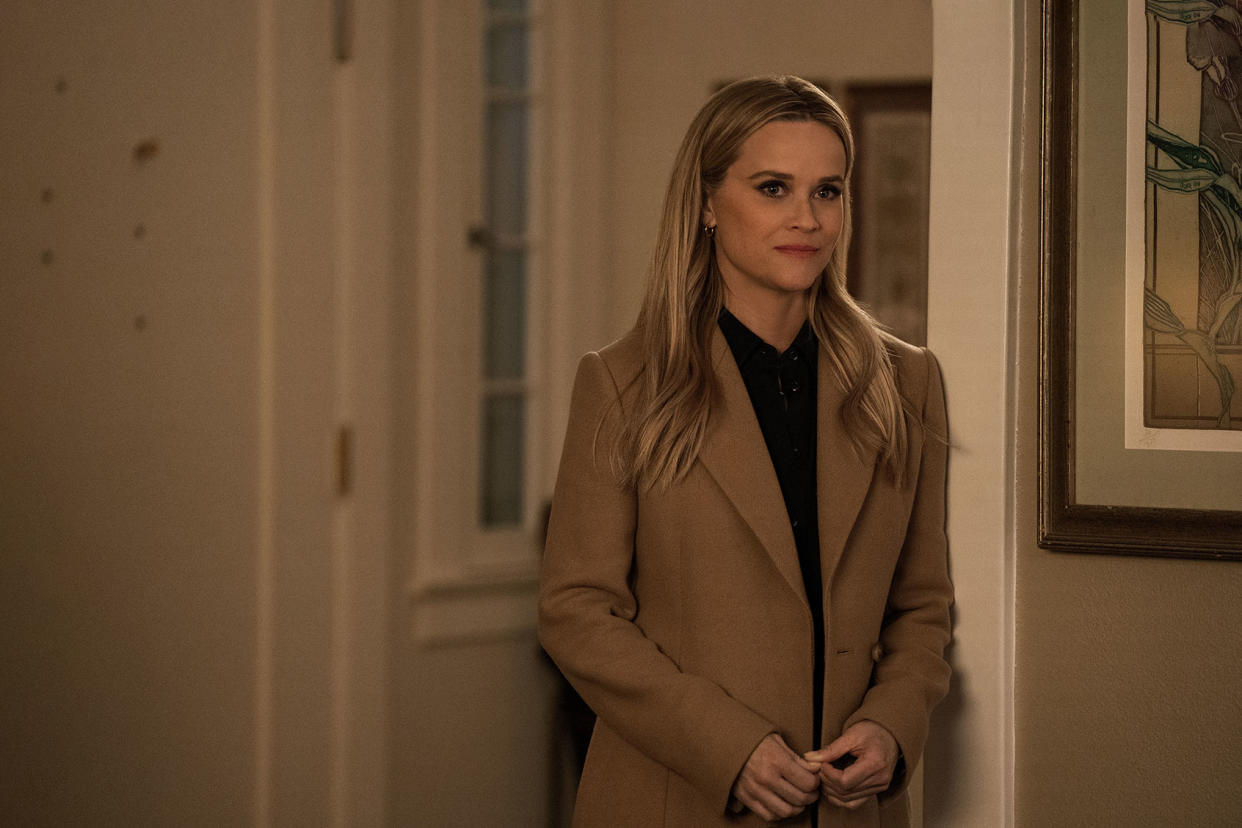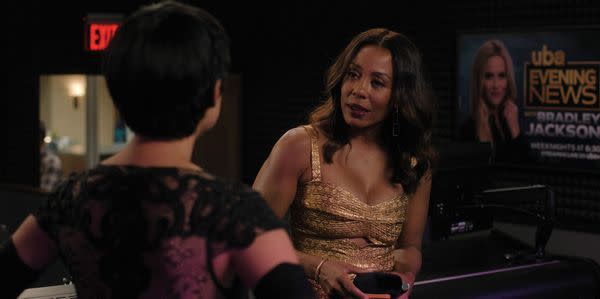It's tough to explain what makes the aggravating "Morning Show" mess appealing

Something has always irritated me about explaining the appeal of “The Morning Show” by citing its messiness. That’s a legitimate answer, but it’s also too pat for a show that’s a ‘90s network primetime soap masquerading as a prestige drama. Power struggles! Backstabbing! Surprise hookups! Sometimes I’m forced to remind myself that the action takes place in Manhattan, not on some mythical version of Melrose in Los Angeles.
But during “Strict Scrutiny,” its writer Bill Kennedy clicks a puzzle piece into place right around the time the UBA’s staff reacts to the 2022 SCOTUS leak tipping off the Supreme Court’s intent to overturn Roe v. Wade.
The news breaks while most of the staff are attending a UBA-Valentino fundraiser for the Fashion Institute of Technology and sends Alex (Jennifer Aniston) scrambling to assemble coverage for her next show. As she and Chip (Mark Duplass) brainstorm on what to include, she directs him to pull a famous quote Ruth Bader Ginsburg shared about the case with members of the Senate Judiciary Committee grilling her in 1993.
“It is essential to woman's equality with man that she be the decisionmaker, that her choice be controlling,” Ginsburg said. Small details like that point to an intelligence and reason behind the season’s overall arc, since that quote's essential meaning contradicts everything each woman in this show represents and does. In this seventh episode, Paul Marks (Jon Hamm) gains more leverage over two of UBA’s most powerful women. Oh wait – that’s not how we’re supposed to view his tumble into the sheets with Alex Levy (Jennifer Aniston), who has only recently recovered from having her affair with her on-air partner and the company resident sexual predator, the late Mitch Kessler, made public.

Alex is smart and unintimidated by Paul, with whom she spars in a one-on-one interview and scores a win by getting him to admit, on camera, that he exploited a young college student by co-opting her million-dollar idea, leading her to attempt suicide.
That student grew up to be . . . news division president Stella Bak (Greta Lee). Even if Alex didn’t know that, she would surely absorb the lesson from that incident that this is a man who toys with people. Or maybe not, because shortly after the cameras turn off and her crew leaves, Alex and Paul – journalist and source, and at this point possibly future employee and boss – start sleeping together.
Simultaneously Paul offers Stella — the person he nearly drove to off herself — the top job at UBA which, at the moment, belongs to Cory Ellison (Billy Crudup). And Stella, a highly intelligent woman, doesn’t just flirt with the opportunity, she gets thisclose to letting Paul put a ring on it. To slow herself down Stella broaches her quandary confidentially to devoted producer Mia Jordan (Karen Pittman), admitting she feels queasy about selling out Cory after he’s been so good to her, the always levelheaded Mia sets her straight.
“Failure for Cory means a big, fat check and another turn in the grand game of corporate musical chairs,” she says. “There are only so many jobs at the top. White men don’t give them up willingly.”
“No, they don’t,” Stella admits. “But do I want to be like them?”
“Please. You already stepped over a few bodies to get here,” Mia reminds her, adding, “I think the only difference between us and them is that we let the ghosts torment us.”
Right there, this exchange illustrates this show’s potential to be an insightful, elucidating workplace drama that honestly portrays the stakes and pitfalls of working in media or any high-level corporation. This season has struck a couple of bullseyes in terms of depicting the two-tiered compensation system at UBA wherein Black employees are paid less than their white colleagues for doing the same job, a fact with which Mia is as familiar as how the rest of the game is played.
So . . . why doesn’t Mia tap into that knowledge to make her own moves? For that matter, why does Christina Hunter (Nicole Beharie) have to be the character to flip out in a bathroom full of fancily dressed white women who aren’t sufficiently bothered about their abortion rights being stripped away? Why can’t the job fall to, say, Alex? Or any woman other than her or Mia?

The core irony of “Strict Scrutiny” is simple to suss, which is that none of the women in this show have a firm grip on their destinies. Neither Alex nor Stella are immune to what smells like manipulation on Paul’s part, although they should know better. Mia is married to her job but somehow unable to demand more from that withholding spouse, including some material assistance in ensuring her freelance photographer/lover Andre (Clive Standen) made it out of a war zone safely.
For reasons that we can’t quite explain Chris — a morning anchor on a major news network — decides to post a selfie of her posing with her middle finger extended after writing “Abort the Court” in lipstick on the bathroom’s mirror.
By inserting real-life headlines into its alternate universe long after their fires have gone cold for us, “The Morning Show” strives to maintain a certain topical relevance while ensuring each season will always feel at least a year out of date. Even that’s something of an improvement since the first season’s #MeToo arc played out about two years after the movement died down.
Still, if one were to remove the actual context of that RBG quote, the third season so far almost competently organizes itself around its female characters struggling and failing in their quest to take control of their careers and their place in UBA’s twisted foxhole.
That’s why it’s frustrating to see the writers transform Alex into what is essentially a version of Julie Chen Moonves, as in a TV personality who binds herself to a millionaire’s power despite his rotten reputation. Alex surfaced revelations about Paul in an interview that, as a reminder, hasn’t aired yet. Admittedly some of my annoyance with this subplot’s development is related to a general irritation at shows that feature journalists sleeping with sources as if that’s, you know, a widespread phenomenon instead of one of the gravest ethical missteps someone can commit.
In this season it’s another tick on the count of occasions where realism is tossed out the window in favor of duh-doy! melodrama. Having said that . . . the love scene between Alex and Paul — or, more to the point, two very attractive actors – was pretty steamy, wasn’t it?
Maybe not as thrilling as meeting Cory’s mother Martha (Lindsay Duncan), which Bradley (Reese Witherspoon) is hauled into doing for reasons that aren’t entirely crystal. That is other than enabling the writers to make a point about Cory having been raised by a politically connected emotional chimera of Joan Crawford and Faye Dunaway. Perhaps mummy's crazy toughened him into the relentlessly ambitious controlling bastard he is today, one who’s still obligated to center himself by listening to a few bars of the Beach Boys’ “Kokomo” before ringing her doorbell.
Mother, it seems, has been freelancing on her son’s behalf – unasked – by poking a few of her D.C. connections to smooth Paul’s acquisition of UBA. The board isn’t pleased by this, according to Leonard Cromwell (Stephen Fry), who urges Cory to put a stop to the meddling.
The real treat is to watching Duncan purr and hiss her way through mood swings, culminating in a roughly whispered, revealing complaint to her son: “It’s so interesting what happens when women get older. We carry this wisdom, but no one cares. And we’ve survived the death cult of capitalism but, really, you just want us to get out of the way, don’t you? You want us to be silent, quiet as the grave.”
Then he sings her into temporary calm by launching into “Ain’t No Mountain High Enough” on the piano, luring Mommie Dearest to join him in a duet. The spell breaks with Martha barking a warning at Bradley that Cory is simply managing both of them.
Seven episodes into the third season a part of me craves some deeper meaning and messaging about information control and the slow strangling of the Fourth Estate by billionaires like Paul Marks, about whom Christina sagely observes, “There are studies that show power, it actually changes the brain. It erases the ability to empathize. It makes me wonder, what does Paul Marks really care about?”
That's probably expecting too much of "The Morning Show." But, to pick up on that note, what does it want us to care about? The end of “Strict Scrutiny” leaves me baffled on that account.
Want a daily wrap-up of all the news and commentary Salon has to offer? Subscribe to our morning newsletter, Crash Course.
Stella’s old friend Kate (Natalie Morales) shows up unannounced to warn Stella that Paul fired her and UBA needs to be investigating him, not getting cozy with the titan. But she soon realizes Stella is back under Paul’s thumb: “This is how you are with him; he owns you,” she says before leaving angrily.

In the car ride on their way back to New York from mom’s place in Connecticut, Cory coldly informs Bradley that they’re not friends: “We are two people who use each other, Bradley. That’s it,” he says.
Back at UBA, after freaking out over a tabloid obtaining a shot of him being intimate with Alex, Paul pulls her into a post-party make-out session in her office. Which Chip, of course, sees.
It is essential that women be the decision makers, which explains why seeing the central women on “The Morning Show” ignore their supposed wits to be handled by the men around them is so aggravating. And that may provide enough of a reason to keep watching – the end of one of their puppet strings may connect to a way out of this murk after all.
New episodes of "The Morning Show" stream Wednesday on Apple TV+.
